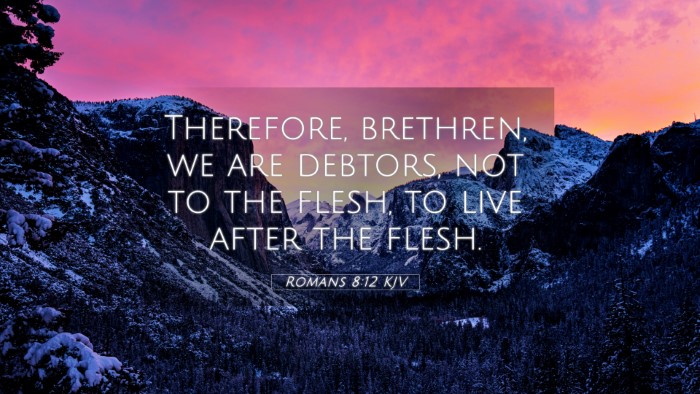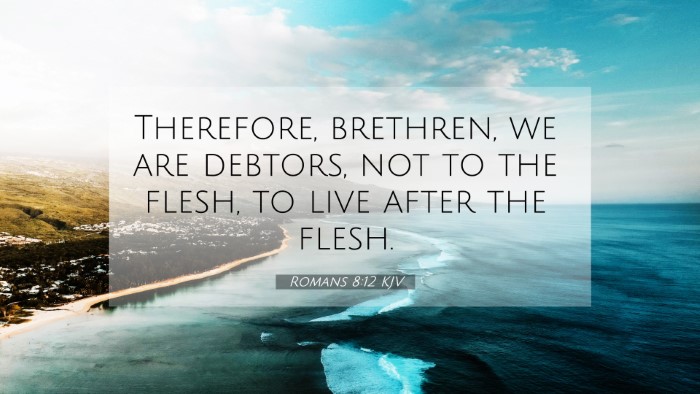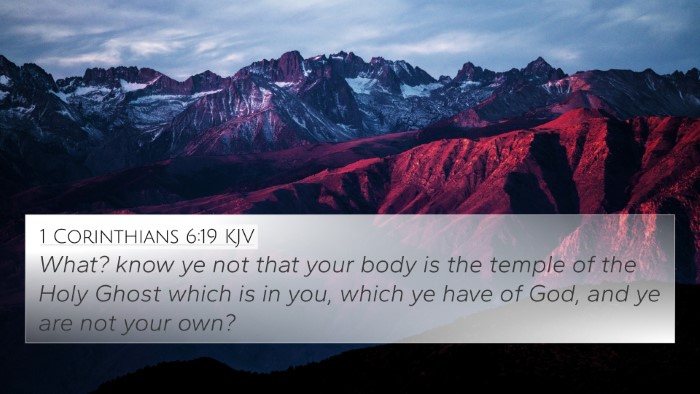Understanding Romans 8:12
Romans 8:12 states: "Therefore, brethren, we are debtors, not to the flesh, to live after the flesh."
This verse addresses the profound responsibility believers have in their spiritual lives. The Apostle Paul emphasizes the idea of being 'debtors'—not to our carnal nature, but to God through the Spirit. Below are the insights distilled from public domain commentaries by Matthew Henry, Albert Barnes, and Adam Clarke.
Meaning of Romans 8:12
The term "debtors" suggests an obligation and responsibility. Christians do not owe a debt to their sinful nature; rather, they are obliged to live according to the Spirit. This concept signifies a transformative lifestyle—a radical shift from serving self to serving God.
Commentary Insights
-
Matthew Henry:
He emphasizes that Christians, being freed from the law and sin, are called to a higher standard of living. Henry notes that this obligation is not a burden; instead, it liberates believers to pursue a life that reflects their identity in Christ.
-
Albert Barnes:
Barnes highlights the contrast between living according to the flesh and living according to the Spirit. He explains that living after the flesh leads to death, while serving God leads to spiritual abundance and eternal life. The debt mentioned here is a call to a life of righteousness and obedience to God's commandments.
-
Adam Clarke:
Clarke focuses on the implications of being 'debtors.' He ingeniously correlates this with the grace of God that requires believers to live in a manner that reflects their gratitude for such grace. He underscores that the flesh, being weak and sinful, cannot be the guide for a believer's life.
Related Bible Cross-References
To truly grasp the depth of Romans 8:12, let’s explore some relevant cross-references that emphasize the connections between these scriptures:
- Galatians 5:16: "This I say then, Walk in the Spirit, and ye shall not fulfill the lust of the flesh." – This verse reinforces the need to live guided by the Spirit.
- Romans 8:1: "There is therefore now no condemnation to them which are in Christ Jesus, who walk not after the flesh, but after the Spirit." – A direct connection to the themes of obligation and spiritual living.
- 2 Corinthians 5:17: "Therefore if any man be in Christ, he is a new creature: old things are passed away; behold, all things are become new." – This highlights the transformative power of a new life in Christ.
- Ephesians 2:1-5: "And you hath he quickened, who were dead in trespasses and sins..." – Explaining the shift from death to life through Christ.
- Colossians 3:1-4: "If ye then be risen with Christ, seek those things which are above..." – Aligning the focus of believers towards heavenly pursuits rather than earthly desires.
- 1 Peter 2:11: "Dearly beloved, I beseech you as strangers and pilgrims, abstain from fleshly lusts, which war against the soul." – Reinforcing the struggle against the flesh.
- Romans 12:1: "I beseech you therefore, brethren, by the mercies of God, that ye present your bodies a living sacrifice, holy, acceptable unto God, which is your reasonable service." – A call to dedicate oneself fully to God.
Thematic Bible Verse Connections
Understanding Romans 8:12 within the broader context of Scripture unveils a rich tapestry of themes including:
- **The nature of sin and the obligation to overcome it**.
- **The importance of living according to the Holy Spirit**.
- **The transformative power of faith and grace in a believer's life**.
- **The contrasts between life in the flesh versus life in the Spirit**.
Tools for Bible Cross-Referencing
To delve deeper into thematic connections and cross-referencing, various tools can aid in the study of Romans 8:12 and its related verses:
- Bible concordance: Helps locate specific words and verses.
- Bible cross-reference guide: Provides an overview of related scriptures.
- Cross-reference Bible study methods: Offers structured ways to explore interconnected scripture themes.
- Comprehensive Bible cross-reference materials: Assist in thorough exploration of biblical texts.
Conclusion
Romans 8:12 serves as an essential reminder of the Christian’s call to live not by the flesh but by the Spirit. This obligation signifies the transformative nature of faith, highlighting a duty that flows from love and gratitude rather than legalism. By exploring connected verses and implementing cross-reference tools, believers can deepen their understanding of these critical theological themes.






